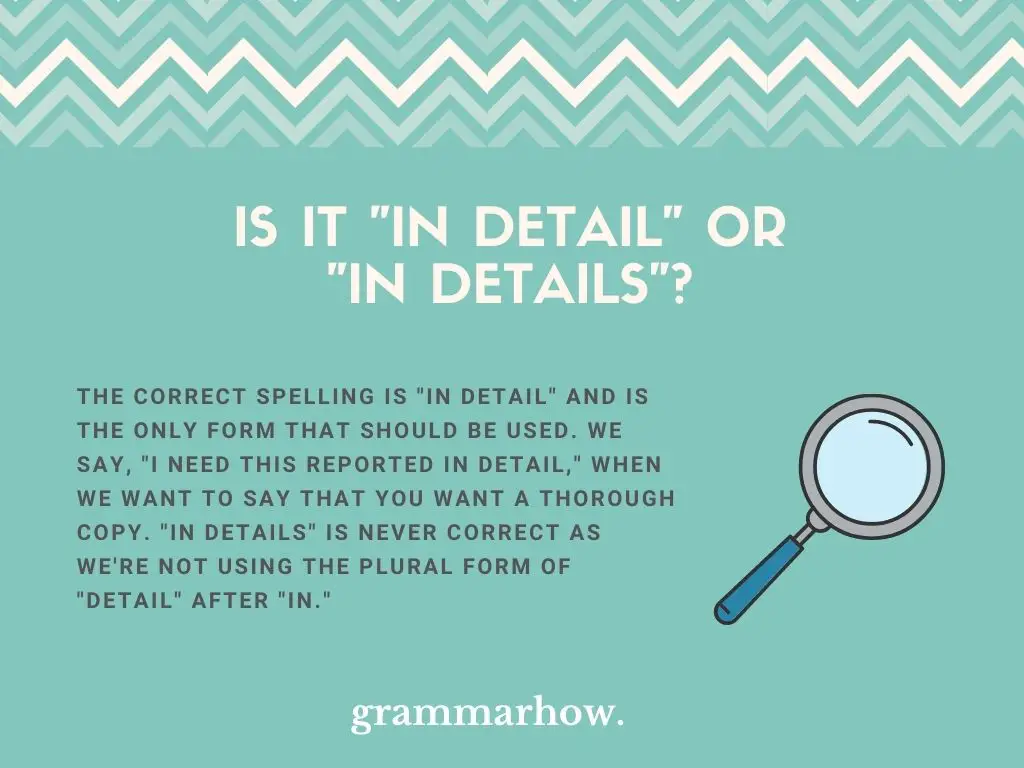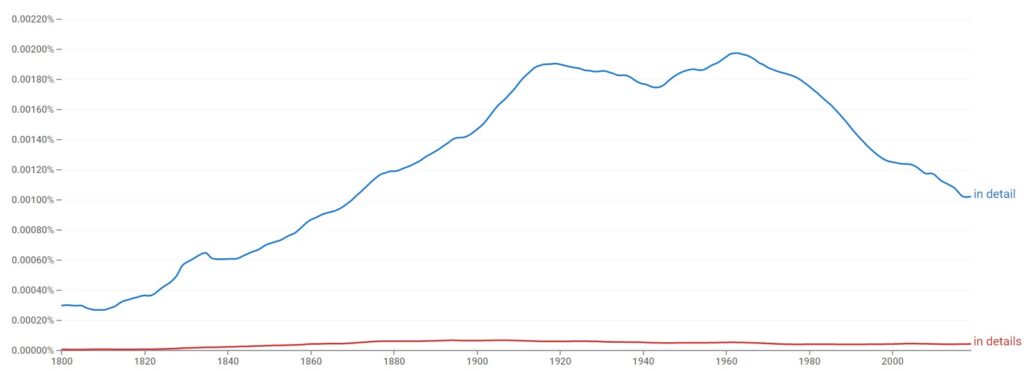Sometimes, words and phrases can be quite confusing to get your head around. A good example is knowing the difference between using “in detail” and “in details.” There is only one correct spelling, so let’s find out what that is.
Is It “In Detail” Or “In Details”?
The correct spelling is “in detail” and is the only form that should be used. We say, “I need this reported in detail,” when we want to say that you want a thorough copy. “In details” is never correct as we’re not using the plural form of “detail” after “in.”

Here’s a good graph to showcase what we mean. We’ve compared the use of the two phrases in English and found that “in detail” is incredibly popular for writers. However, “in details” very rarely gets used.

The only reason “in details” has any usage on this graph is most likely due to human error or typo. Many people confuse the acceptable phrase “in detail” and believe they should add an S on the end, which is false.
Is It Ever Correct To Use “In Details”?
While “in details” is never correct, there is one case where you might use “in” and “details” as part of a phrase. However, we also have to include the word “the” between them.
“In the details” is the closest version we can get to “in details.” “In the details” is correct and is used to tell people to look at the finer details of something.
- The devil is in the details.
- There were a few errors in the details.
These examples show the only time it’s acceptable to use “in the details” in a sentence. If you’re not using it for these reasons, then you can’t use it at all.
We use “the” to be more specific with our language, which allows us to use the slightly more specific plural form “details” when we include it.
Is It “In More Detail” Or “In More Details”?
The same rules apply when we include words between “in” and “detail” that aren’t “the.” If we look at “more,” we’ll hopefully be able to tell already which one is the most grammatically correct.
“In more detail” is the only correct form and follows the same rules as “in detail.” We must leave it in the singular this way, even when we’re implying that there is more than one detail to go over.
It’s a language rule that isn’t easily explained and is better left ingrained in your memory. We’ll go over some examples in a while to show you exactly when situations appear where “in detail” show up. Hopefully, after that, you can start using the phrases a lot easier and memorize them ready for your own use.
You may also like:“In More Detail” – Complete Usage Guide (With Examples)
Is It “Every Detail” Or “Every Details”?
Again, we’re still using the same rule, no matter what words we’re putting before “detail.” This time, if we remove “in” and change it to “every,” we still have to make sure to include the singular.
“Every detail” is correct, while “every details” is incorrect. “Every” is used as a plural word, but it’s uncountable, just like “detail” is. That’s why we don’t include the S at the end of the word.
Uncountable nouns are difficult to grasp at first, but with more practice, they’ll get easier.
Is It “Read In Detail” Or “Read In Details”?
This time, we’re reading something, but again, no language rules are changed.
“Read in detail” is the only correct form here. “Read in details” is incorrect and should never be used.
When Is It Correct To Use “Details”?
We use details when we include the word “the” beforehand. Since it’s an uncountable noun, it’s important to put “the” before it to make sure people know that we’re being a little more specific about how many details we’re dealing with.
It’s also possible to use “details” when we’re writing about them in the plural sense. However, this doesn’t always apply.
- Details are important.
We don’t need “the” at the start here, but “details” is still correct. That’s because we’re talking about more than one detail without any additional words to accompany it.
- These are my details.
Again, we’re talking about a plural form of “detail,” where we’re giving someone more than just one “detail” about ourselves.
7 Examples Of How To Use “In Detail” In A Sentence
Let’s see when we might use “in detail” in a sentence. It’s the only correct form of the two phrases we’ve covered so far, so you might already know what kind of examples to expect.
- I need to go over this report with you in detail.
- We need to have an in-detail discussion about this.
- I’d like to go further in detail with you.
- I’ve read this book in detail over one hundred times.
- You only talk about my bad parts in detail.
- This is poorly executed. I found some mistakes that I want to share with you in detail.
- We should go over this in detail.
7 Examples Of How To Use “In Details” In A Sentence
“In details” isn’t grammatically correct, so we can’t share examples. However, we can use “in the details” to show you when that is correct.
- The problems are in the details.
- The mathematical solutions are in the details.
- The devil is in the details.
- The finer things in life are in the details.
- He made a lot of mistakes in the details.
- We talked about writing in the details.
- Read between the lines. It’s in the details.
“In Detail” – Synonyms
Finally, let’s look at some alternatives we can use that have the same meaning as the phrase “in detail.” That way, you don’t have to worry about getting any language rules wrong and can focus your attention on this!
- Extensively
Checking over something extensively means you’ve put a lot of thorough examination and thought into it.
- Thoroughly
Another great synonym that shows how detailed you’ve been with your work.
- From top to bottom
This is a good synonym that implies you’ve read your work through from top to bottom to check for errors.

Martin holds a Master’s degree in Finance and International Business. He has six years of experience in professional communication with clients, executives, and colleagues. Furthermore, he has teaching experience from Aarhus University. Martin has been featured as an expert in communication and teaching on Forbes and Shopify. Read more about Martin here.
